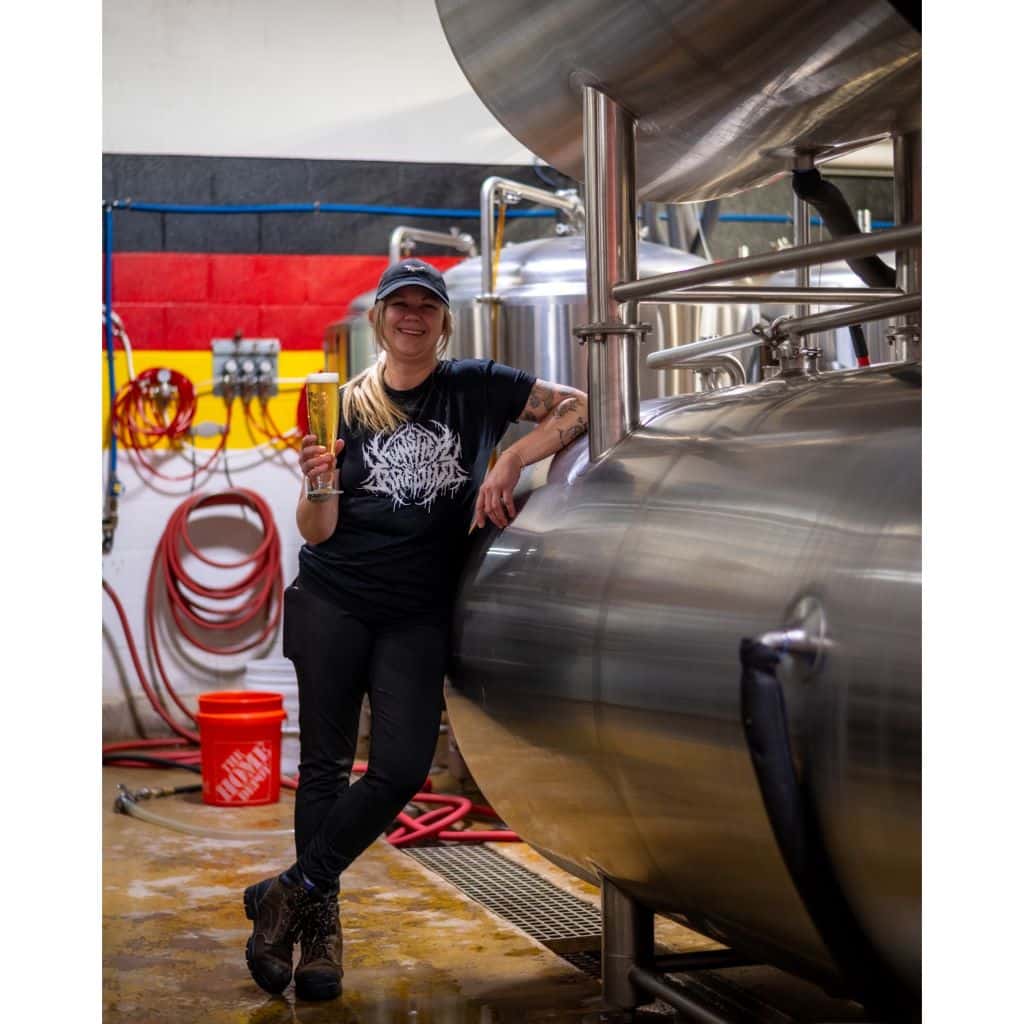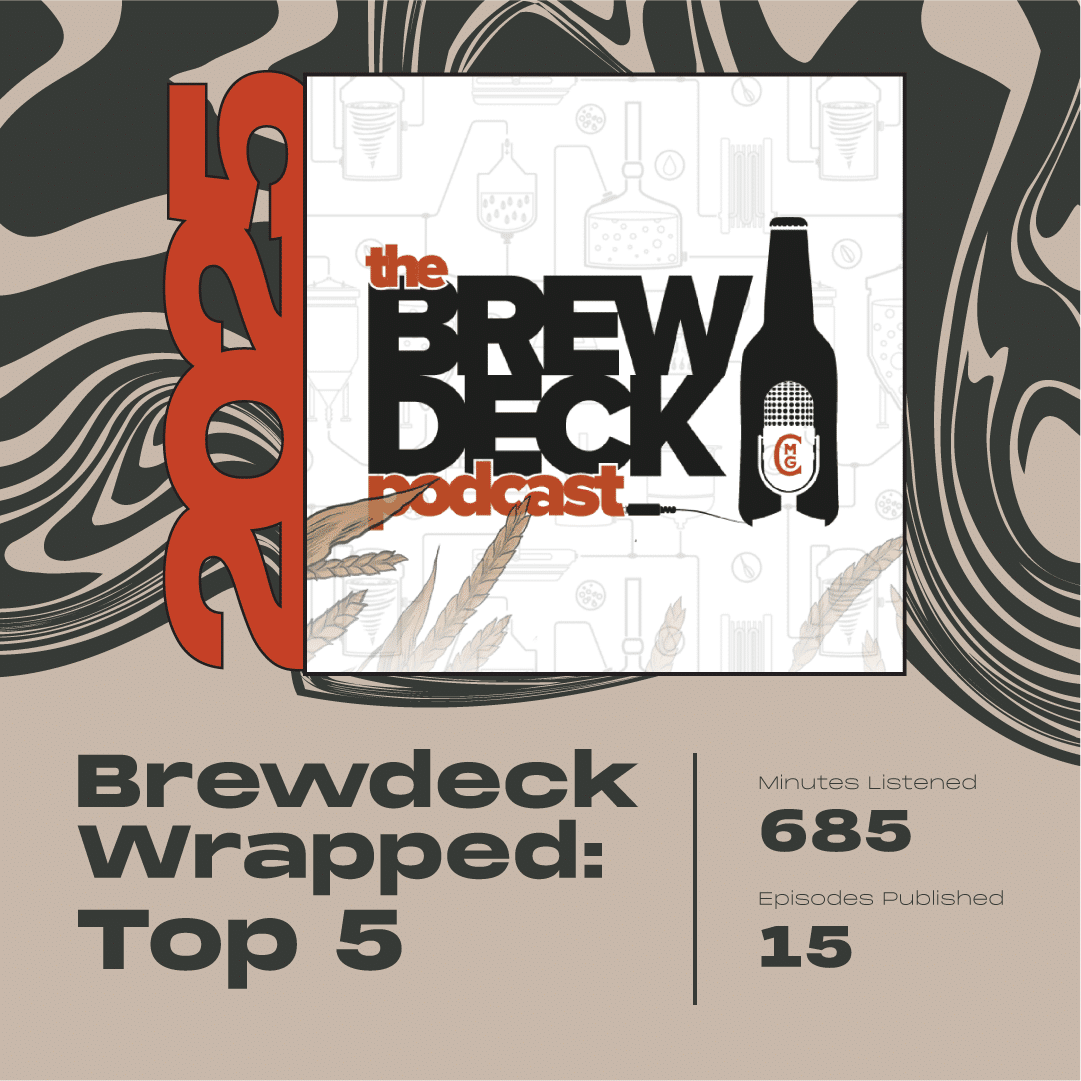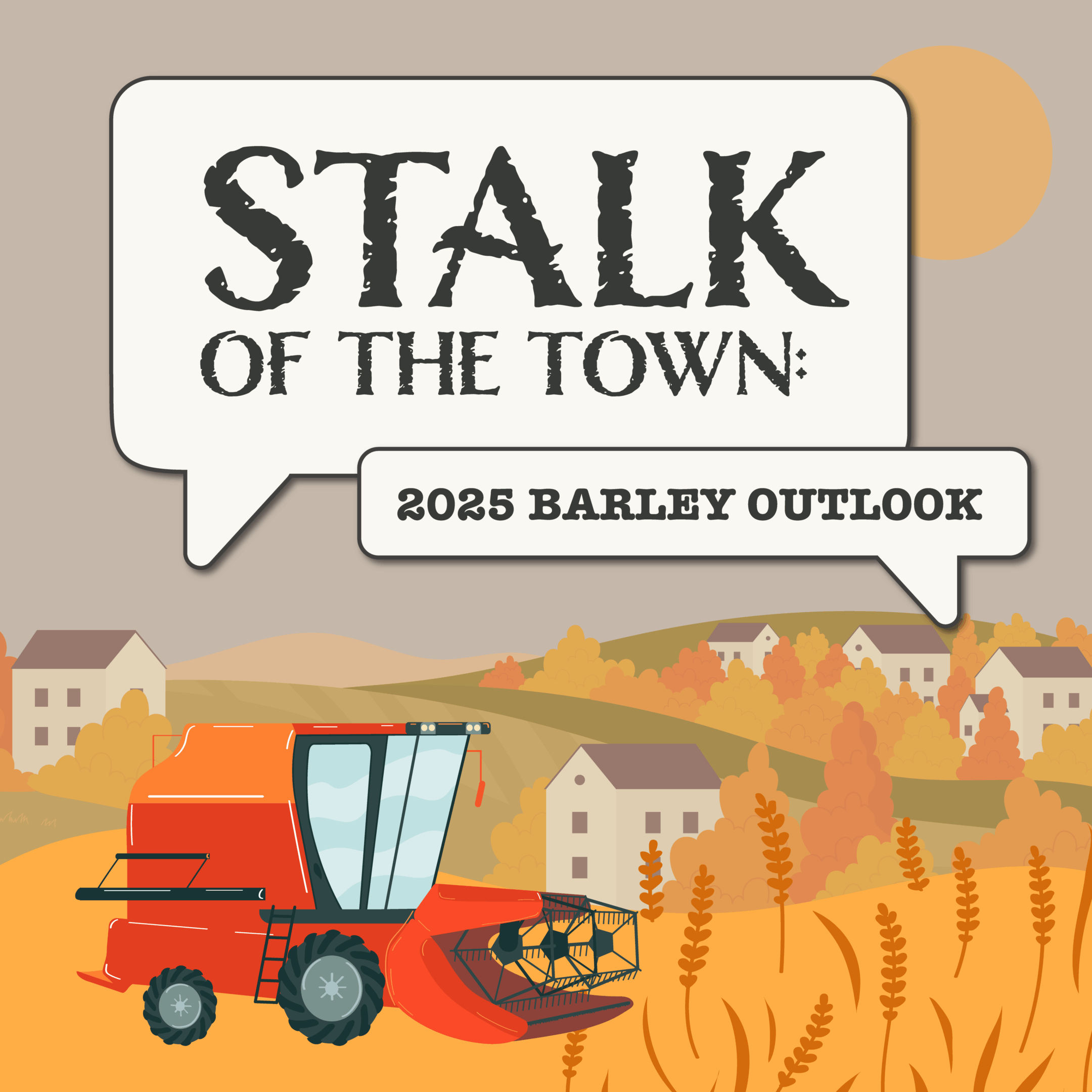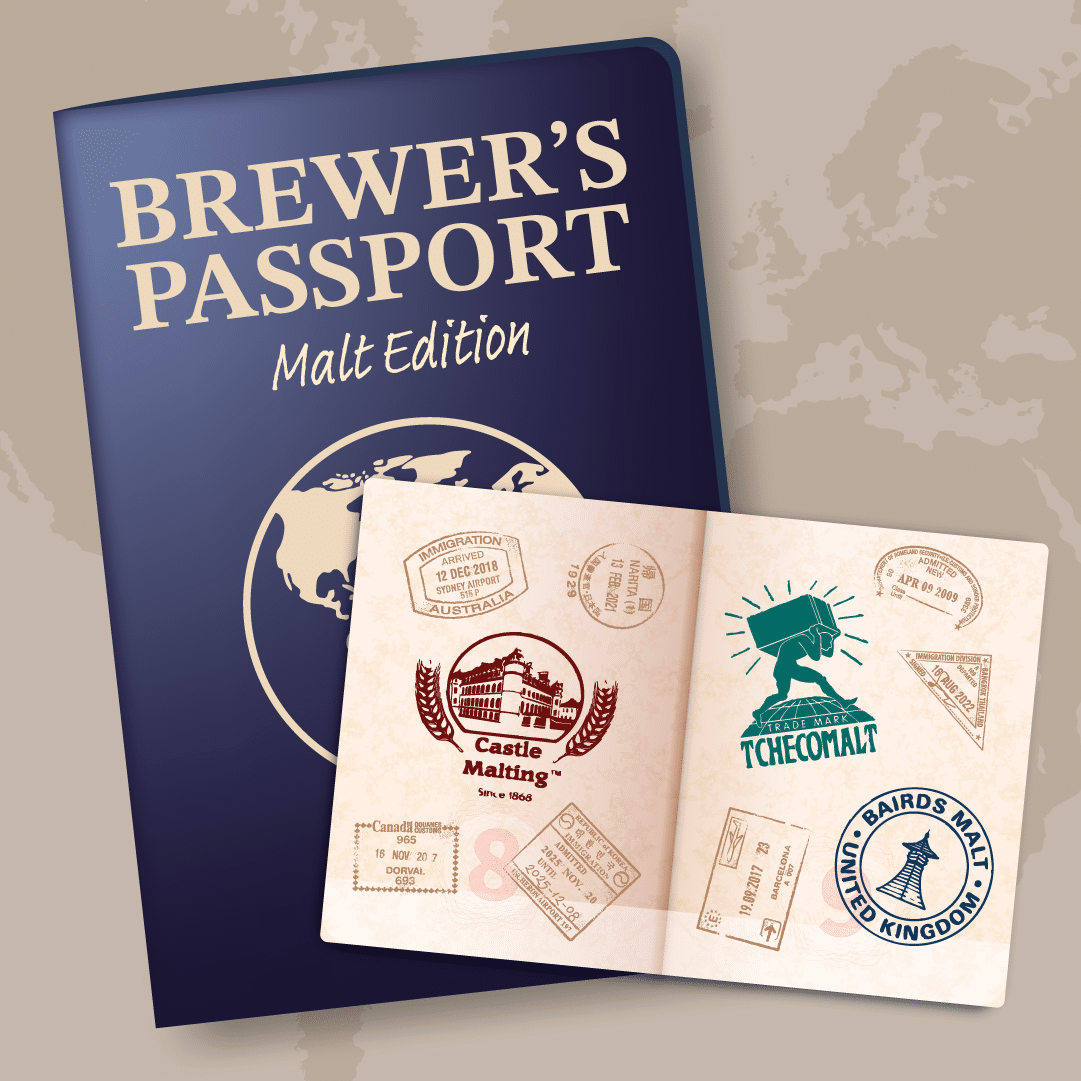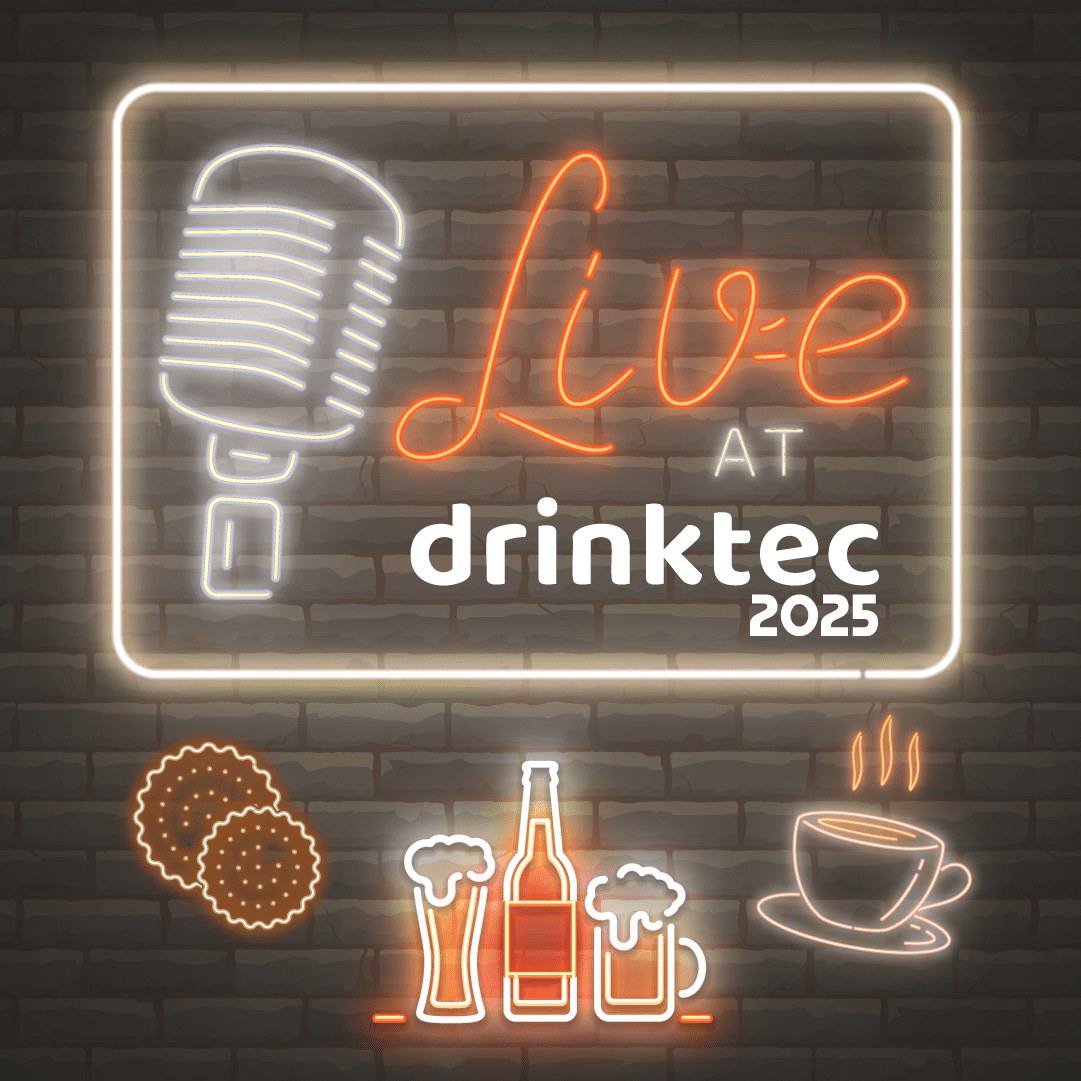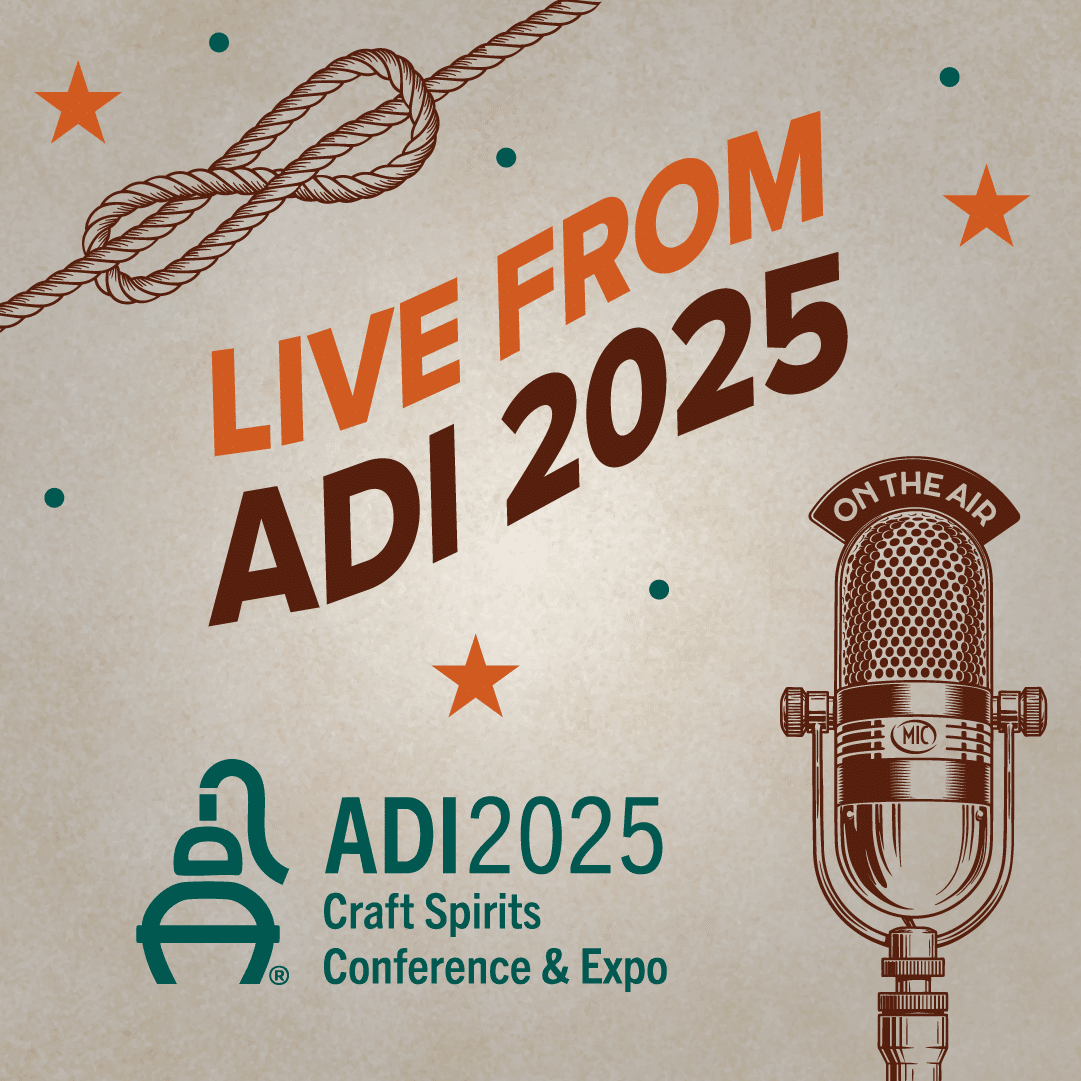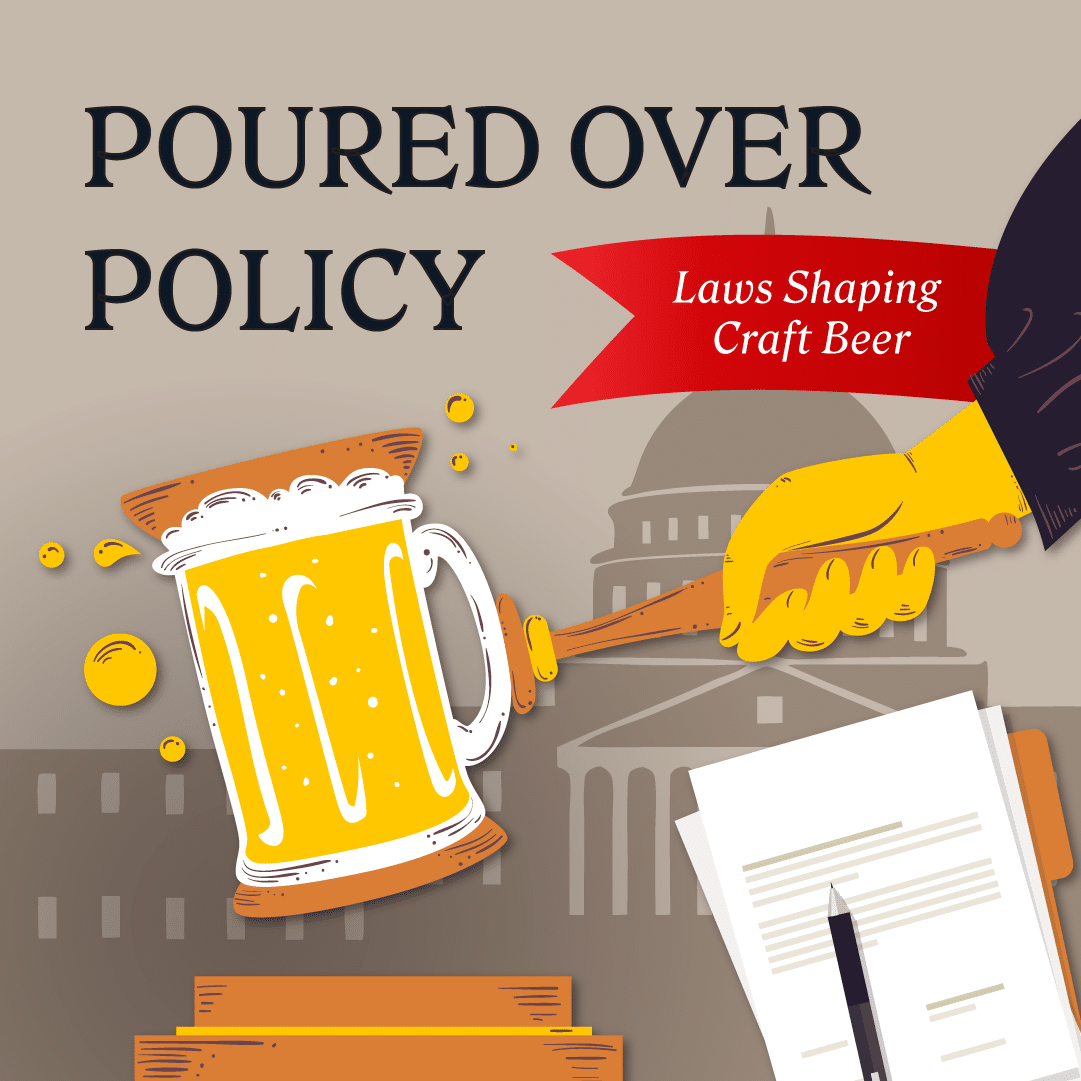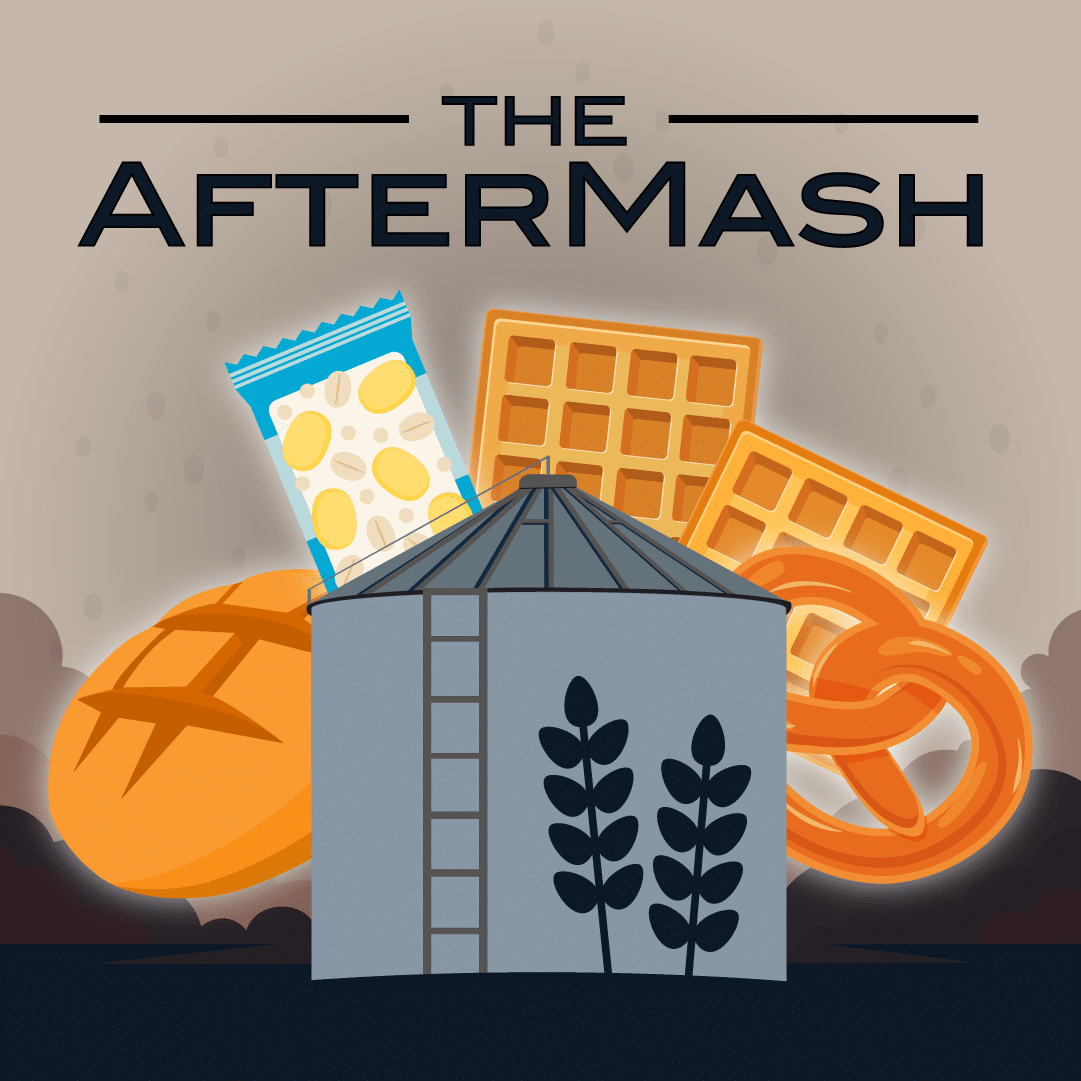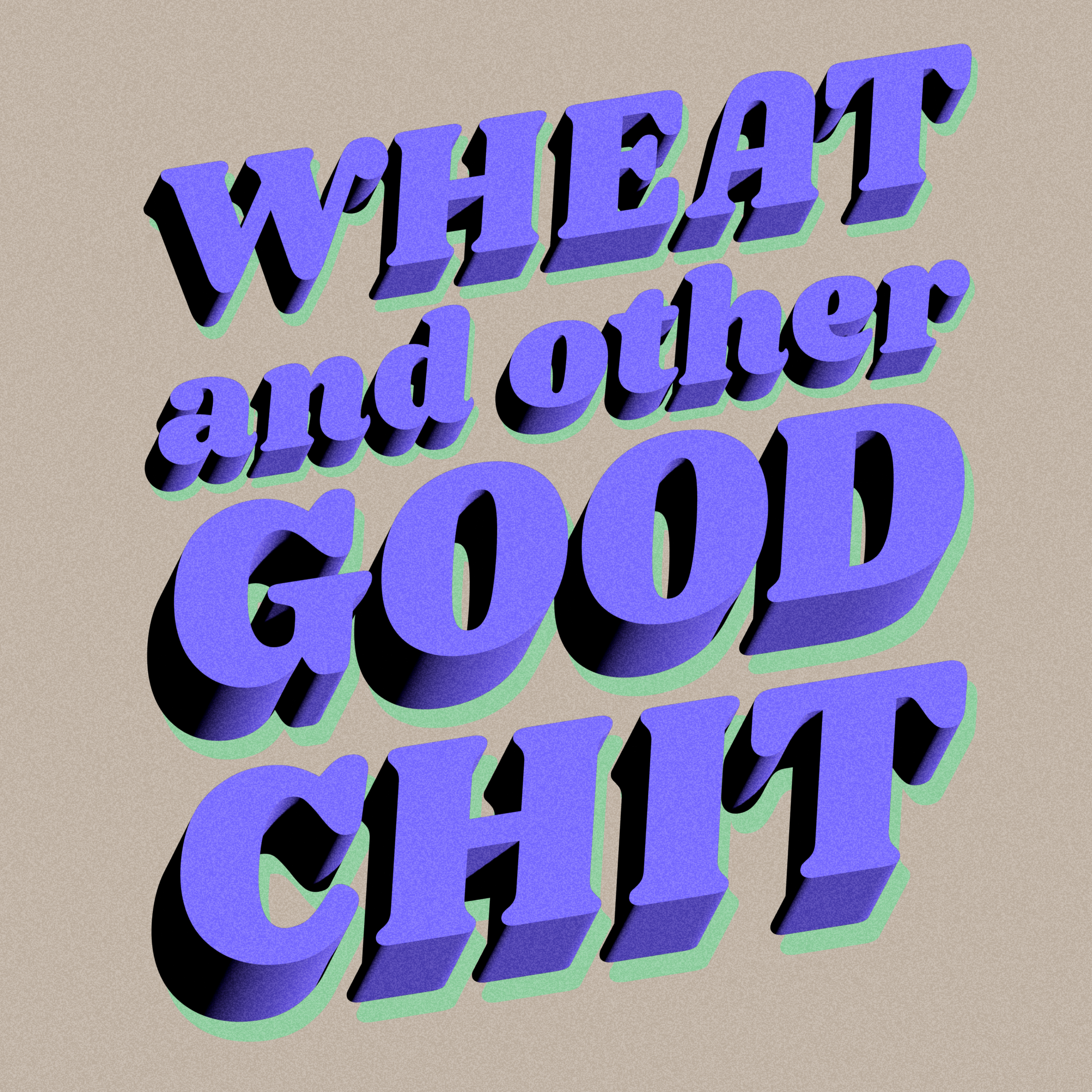
PODCAST GUESTS
Dyke Beer
A Brooklyn-born, queer-powered craft beer company reclaiming space, flavor, and pride.
Founded by activist dykes Sarah Hallonquist and Loretta Chung, Dyke Beer emerged from the ashes of the pandemic and the fading echoes of lesbian bars. Their mission? To honor the legacy of lost queer spaces and craft new ones—where everyone who’s ever felt like an outsider can belong.
Their flagship brew, the Dyke Beer Saison, is a crisp, farmhouse ale with notes of bubblegum, white pepper, and black tea—a nod to the traditional Belgian style, but with a distinctly queer twist. Then there’s the Tall Girl Gose—hot-pink tribute to trans women, femmes, drag queens, and all the tall queer girls who’ve been overlooked. Brewed with hibiscus, lingonberries, raspberry, and Himalayan pink salt, it’s a tart, fruity, and unapologetically sweet celebration in a can.
Dyke Beer is a love letter to the past, a toast to the present, and a rallying cry for the future. They’re here to remind us all: you exist, you matter, and you deserve nice things.
Check them out at lovedykebeer.com and on Instagram @dykebeer. And if you’re in NYC, don’t be shy—reach out!
Molly Flynn
Molly has been a part of the beer and brewing industry for about thirteen years, bringing a deep passion and dedication to her craft. Among her favorite beer styles are Helles and Czech dark lagers.
Born in Fairbanks, Alaska in June 1991, Molly grew up in a military family, both of her parents were in the Air Force. Her early years were shaped by frequent moves, including four years in Japan before relocating to San Angelo, Texas in 1998. In 2010, she moved to Florida, and as of October 2024, she now calls San Antonio home.
Outside of her professional life, Molly enjoys painting, hiking, cooking, and attending music festivals. For the past seven to eight years, she has also been deeply involved with various nonprofits, focusing on raising funds and awareness for mental health, domestic violence, and veterans affected by PTSD, causes that hold personal significance for her. Driven by this commitment, she aspires to establish a nonprofit of her own.
Her latest initiative, The Reflections Project, is a heartfelt effort to advocate for mental health within the beer and service industry, an area she believes is in urgent need of support and visibility.
MORE EPISODES
SEASON 6, EPISODE 9: POUR SOME PRIDE ON IT
PODCAST HOSTS:
HEATHER JERRED – TERRITORY MANAGER, COUNTRY MALT GROUP
BRITTANY DRENNAN – TERRITORY MANAGER, COUNTRY MALT GROUP
PODCAST GUESTS:
LORETTA ANDRO CHUNG – FOUNDER, DYKE BEER
SARAH HALLONQUIST – FOUNDER, DYKE BEER
MOLLY FLYNN – FOUNDER, THE REFLECTIONS PROJECT
Key Points From This Episode:
- The group discusses the importance of mental health awareness and support in the craft beer industry
- Features a conversation with the founders of Dyke Beer, a queer-owned brewery in NYC, about building community and inclusive LGBTQ+ spaces
- Molly Flynn discusses The Reflections Project to support mental health in the brewery and service industries
- Highlights challenges in the beer industry, such as burnout and limited access to mental health services
- Encourages companies to implement policies and programs that support employee well-being
- The group stresses the need to reduce stigma around mental health and promote open, supportive conversations within the craft beer community
Resources From This Episode:
- 988 – Suicide & Crisis Helpline in Canada and the US
- The Craft Brewers Guide to Cultural Observations – Observing Pride Month
Transcript - Pour Some Pride On It
EPISODE S.6, E.9
[POUR SOME PRIDE ON IT]
Heather (00:09):
Welcome back to another episode of The BrewDeck Podcast! I am your host, Heather Jerred, joined by my other amazing host, Brittany Drennan. Welcome, Brittany.
Brittany (00:18):
Hi.
Heather (00:19):
Before we dive into the episode, I do want to give a trigger warning to our listeners. In this episode, we do discuss mental health, domestic abuse, suicide, and some [00:00:30] language that people may find triggering, so make sure you listen with care. It is Pride Month. It’s June. Pride Month is celebrated in June to honor the Stonewall Uprising in New York City in 1969. We talk a bit more in depth about the origins of Pride in our first Pride episode we did, which was season 3, episode 10, Liquid Pride with a Purpose. So if you’d like to learn a bit more about that, go back and give that a listen. As well, we wanted to share some resources with our [00:01:00] listeners. We did share this article previously. The Brewers Association had put out an article back in 2022 entitled The Craft Brewers Guide to Cultural Observations, Observing Pride Month. It has a lot of fantastic resources about how to safely and respectfully observe Pride Month in your business, so please go check that out if you were interested. We’ve linked the article in our show notes as well.
Brittany (01:22):
And I just want to say that here at Country Malt Group, we are proud to be part of a global family of brands [00:01:30] Soufflet Malt. Together we’re committed to fostering diversity, equity, and inclusion throughout our entire organization. We also strive to create and uphold an environment where everyone is safe, welcomed and has a sense of belonging regardless of gender, identity, ethnicity, or their personal beliefs.
(01:49):
A few statistics that we found pretty alarming and important both in Canada and the US, according to the Mental [00:02:00] Health America website, here in the US, 4.5% of our US population identifies as lesbian, gay, or bisexual. And of those, over 39% reported having a mental illness in the past year. That is nearly 5.8 million people. And in Canada, 30% of the LGBTQ+ community reported fair to poor mental health. [00:02:30] One in four LGBTQ+ youth reported thoughts of suicide. So if you or anyone you know is struggling with your mental health, please contact the National Suicide Prevention Helpline, Suicide and Crisis Lifeline by calling or texting 988. This is available in both the US and Canada.
Heather (02:50):
Today we are chatting with the founders of Dyke Beer and we’ll also be talking to Molly Flynn from the Reflections Project about Pride [00:03:00] and mental health. So let’s dive in. We are now joined by Sarah and Loretta, who are the founders of Dyke Beer, to talk to us a little bit about the beer and the projects that they work on. Welcome, Sarah and Loretta.
Sarah (03:16):
Thanks so much.
Loretta (03:18):
Hi. Thanks for having us.
Heather (03:18):
Thank you for taking time in your schedule to come and join us. I know you’ve got a lot of stuff on the go. Before we dive in and talk about the beers, can you tell us a little bit about yourselves, how you got into the craft beer industry?
Loretta (03:28):
I got into the craft beer [00:03:30] industry because I like beer. I also have done some home brewing. Sarah was doing more of it and I just wanted to see how it’d be to brew beer and make something that was going to taste better than we have at our local bars. Because a lot of lesbian bars just have your run-of-the-mill beer, so we wanted something more upscale.
Sarah (03:53):
Absolutely. And Loretta and I first started as friends and as I guess business partners [00:04:00] volunteering for this organization called Dyke Bar Takeover. We were basically popping up throughout a few bars in New York City. There weren’t a lot of parties at this time. This was pre-COVID for sapphics, dykes, lesbians, transgender, the queer community. And so through that project, once COVID hit, we were like, how do we make this our job? We’re having so much fun creating these parties for queer people and having these queer artists showcase and giving money to queer mutual aid.
(04:27):
And the idea of Dyke Beer came up of creating [00:04:30] actually a physical product to be able to sell and have as a business and create this cool queer business for the community. And as Loretta said, a lot of the bars didn’t have great craft options. A lot of it is PBR and Coors and Miller and this sort of thing. And so, we were really excited to create something beautiful and fun for the community. I ended up going to Cornell Brewing School, did some home brewing as well. Since then, we’ve been creating even more pop-up parties, the beer, and a little bit of a line of merch as well.
Brittany (04:59):
Hell yeah. [00:05:00] So what’s the history behind why you chose the name?
Loretta (05:04):
There are several reasons. One big one is an ode to the Dyke March that has been around for 25, I think, 27 years now, I’m not sure exactly. But it started in the ’90s just to give visibility to queer women, lesbians and show that we exist, we’re here and we’re a variety [00:05:30] of looking people. We’re not just butch, we’re not just femme, we’re the whole gamut of it. And I think that there had been a long stereotype of what a dyke was. And back in the ’50s, ’60s, it was used as a slur the same way that gay or faggot was and sometimes still is used. So it is a way to reclaim the word and a lot of [00:06:00] queers in the community identify as queer. They also identify as dykes. I have my friends who identify as dykes. It’s a very loud expressive in-your-face word that has a lot of power and history behind it.
Brittany (06:13):
I love that.
Heather (06:15):
How has the craft beer community in a whole responded to Dyke Beer?
Sarah (06:21):
We got a good response. We’re part of the New York City Beer Guild. There’s about 80 or so members of local breweries. They’ve [00:06:30] been great to us. I think because New York is so queer-friendly, there’s so many various queer bars. We have an LGBT center. People know queer people and it feels like people can be out here in the city. I don’t know as a country how people are reacting to us really. We don’t tend to get many hate comments on our Instagram or in our email or anything, because right now the political plane of the country is under Trump and seems very conservative and [00:07:00] people are vocally have spoken against queer rights and there’s a lot of laws right now especially against the transgender community happening in almost every single state right now and at federal levels as well.
(07:12):
And so, it’s really a time to show that you’re queer, you’re proud, you’re out. And I have to say this, Pride has felt a little weird and a little scary to be honest. I went to an event at Stonewall in the Village, and I mean that’s the birthplace of some of our [00:07:30] queer rights there.
Heather (07:31):
Pride movement.
Sarah (07:32):
It’s like a really big symbol for us. I was walking down the street and I was in leatherwear. I was in an ACT UP shirt that has the pink triangle, which is our queer Holocaust symbol on it. I remember people were actually crossing the sidewalk in front of me afraid to go near me.
Heather (07:51):
Oh my God.
Brittany (07:52):
What?
Sarah (07:52):
The whole city had been so gentrified that I was the biggest freak apparently in a-
Brittany (08:00):
[00:08:00] In the Village.
Sarah (08:01):
… queer neighborhood in the village, going to Stonewall, going to a party, and I’m really into wearing the leatherwear this year, I think because there’s a few conservative queer people who are against leather at Pride and just being like, look, you can wear what you want. You can express your way how you want. Leather families are really important to certain queer people, and so just being out there and being supportive of the whole community. You can’t just pick and choose and say, “I can get with cisgender queer people but not transgender people.” That’s not [00:08:30] how it works. It’s the whole thing, the whole LGBTQ+++++. And so, I think we really stand for that. I think that’s a huge thing about being a dyke too. That’s part of the radicalness, that’s part of the equality. There’s a lot of statements about, I’m non-binary and a dyke. I am transgender and a dyke. And people talking about their stories of those two words connecting in some sort of way and those identities going hand in hand.
Loretta (08:54):
I think it depends where we go. And it’s always a surprise to know who is comfortable [00:09:00] with even the name Dyke Beer because there are, and I’ve talked to some men that feel like they can’t say the word because it would be insulting, and I just tell them, “If you don’t say the word with a malicious tone of voice, you can just say, yes, I’d like some Dyke Beer. It’s fine.” I’ve had good conversations with bar owners where they’re asking, “Why is it Dyke Beer? Why do lesbians need their own space? Don’t we have gay marriage equality? Aren’t you guys equal?” [00:09:30] And it’s been nice to have those conversations just to let them know what our community needs. And for us, Dyke Beer, we’re not only creating beer, we’re also creating spaces for queer women to just hang out. Whether you drink beer or not, it’s just more to be in community.
Brittany (09:47):
That’s awesome. Well, yes, speaking about the beer, the first beer that you created, was it Belgian style saison? Is that right?
Loretta (09:54):
That’s correct.
Sarah (09:54):
Yes.
Loretta (09:55):
That’s our staple beer.
Brittany (09:57):
I love a saison.
Sarah (09:59):
I love a saison. [00:10:00] It’s literally my favorite. And we don’t really have a mass marketed one. We don’t really have the American saison. And it’s funny if, I’m sure you guys have gone to Belgium because you’re part of this podcast and you really like beer.
Heather (10:15):
Yes.
Sarah (10:18):
But even in Belgium, when you order from Delirium or you order from a place with a lot of different beer styles, I remember I was like, just give me every saison you have on the menu. And they only gave me four different beers, and one of them was saisoned upon of course, but I was [00:10:30] really shocked that even in Belgium, they don’t have a lot of this excellent style of beer. And I was like, wow, what a swing and a miss. I can’t believe this. Whereas if you asked for an IPA here, you would get-
Heather (10:42):
25 million?
Sarah (10:45):
100,000. I’m going to just say I think it’s the most underrated beer in the world.
Brittany (10:48):
So is that why you chose that style for the first beer?
Sarah (10:51):
I think part of that, and I wanted it to be, and Loretta too, easy drinking, light. So you’re talking about an audience that’s used to drinking a lot [00:11:00] of watered-down lagers that are drinking Bud and drinking Coors and drinking PBR and this sort of thing. So not to go aggressive or scare people right away, our second beer is a gose that has lingonberry, raspberry and hibiscus in it. And so, that is a completely different palette changer. So I think we wanted to go a little softball with our flagship ale, our first ale, and just be like, hey, craft can be really good and this is a great beer style to show how good it can be, especially if you’ve never drinking craft beer before. [00:11:30] This is a great introduction.
Brittany (11:31):
Yeah, definitely. And you released a Mexican lager too?
Sarah (11:34):
We do. That’s our newest one.
Loretta (11:36):
We wanted to do a light beer, so our Mexican lager is also called Dyke Light. I just wanted something refreshing for the summer. Also, a lot of our customers have been asking for it because they are used to drinking lagers.
Heather (11:51):
So you had mentioned the Dyke Bar Takeover series and that’s how Dyke Beer was born. Can you tell us a little bit more about that program?
Loretta (12:00):
[00:12:00] So that was started about 2017. What we would do is we would take over a bar as soon as they opened, 5:00 P.M. until 9:00 P.M., get some local performers, charge a door ticket, pay the performers, and then whatever was left over, we would donate to a mutual aid, our local nonprofit. And it was just a way for us to have our own space and not have any cis guys hitting on any of our community. We had a variety of bands, [00:12:30] singers, kink workshop, rope tying workshops, all kinds of different things just to bring people together. And then COVID hit, so we stopped doing that then.
Heather (12:41):
Can you mention some of the organizations that you did donate to the proceeds from these events?
Sarah (12:46):
Remember, we definitely did SAGE. We probably did the LGBT center at some point. We did a Mariposa organization that, God, there was a hurricane that decimated some of the island LGBT centers like [00:13:00] in Dominican Republic and Puerto Rico, and so it was rebuilding that area. So sometimes it would be after a natural disaster, we would also give to wherever that natural disaster was. I think at some point, there was something horrible that happened at a gay bar in Denver or somewhere, remember, and we gave to that cause, but it usually was political.
Heather (13:22):
How did you get the word out about it? Was it just social media and was it day of you were just like, we’re going here today?
Sarah (13:28):
Gen Z is going to laugh [00:13:30] at this. A little bit pre-Instagram, we were still on Facebook, so we were putting up pictures on Facebook and then Friends and Lovers was a bar that we took over a lot, so they allowed you to do a printout and put it in the window. So I guess people walking by this obscure bar in Crown Heights could maybe see it in the window as well. I would be on PowerPoint uploading photos from different people sending it via email of being like, show me your photo of you playing a guitar and figuring out what fonts to use [00:14:00] and how to shift everything. And Microsoft doing it super bad of course, and being like, oh my God, I have to make this slide all over again. It was like painstaking in hours long. I couldn’t believe how much easier Instagram was after doing this.
(14:14):
And I’m sure we reached way less people and it had to be word of mouth after a while, but it was really homegrown. Dyke Beer has always felt a little bit ziny in the way that we’ve advertised, so the Dyke Beer logo on a can looks like a label maker label [00:14:30] to give homage to that homemade Dyke Bar Takeover thing we were doing.
Brittany (14:35):
You guys host other events around New York City. Can you tell us a little bit about them and why it’s so important to create those?
Sarah (14:43):
Sure. Right now, we are in the midst of Pride, so we have a bit more programming. We usually do this Bingo at The Bush thing, which is a free event, which is great. There’s a lot of events that have a cover and it’s just silly, fun prizes that usually have some queer joke [00:15:00] to them or it’s physical cans of Dyke Beer or something. It’s really different because our host, Gabby, is so funny and she asks everybody’s sign, everybody’s pronouns, everybody’s name. If you mess up in Bingo and you didn’t really get it, she makes you do a walk off to a dance song.
Heather (15:16):
Walk of shame.
Brittany (15:16):
Amazing.
Sarah (15:17):
Fight for your life. She’s had two people. She’s like, “Let me see your Hinge if you’re single. Is somebody else on Hinge?” It’s like crazy. Goes above and beyond what Bingo is. And so, [00:15:30] I think people have met friends and felt a real sense of community, and we have actually a group of regulars that keeps going back. It’s like being at somebody’s wild house party or something.
(15:39):
One of our clients is Kick Axe, that’s an axe-throwing bar. So we have a dyke axe-throwing thing. A lot of people love this, that it’s not just like, oh, go in a bar and sit down and maybe meet somebody or maybe be shy. The activity forces you to talk to people or experience some sort of joy or even if you’re in a couple, it’s like, oh, let’s just do something [00:16:00] that’s different. And so, we get a mixed bag of singles and couples that go to that event, and some people really bring a ton of friends. We usually get about 100 people that end up showing up to Axe.
Brittany (16:10):
I’ve never made one of those stick.
Sarah (16:14):
I’ve never tried.
Brittany (16:17):
It’s atrocious. I don’t know what I do, but I can’t. That one’s not for me, but that sounds really fun.
Sarah (16:24):
It feels really good. And I mean, we definitely have the traditional dance party too. I mean, the [00:16:30] thing I think if you are listening to this and you’re like, oh, I’d like to create parties in my town or something like that, you have to listen to what the people actually want. You have to pull people and see from different generations, different walks of life, what they’re actually looking for, and then do that, because we’ve actually had a D&D day too, and I don’t play Dungeons and Dragons, but man, it was a different crowd than the dance parties and they showed up for D&D Day.
(16:56):
It’s great to create these different doors for our community to walk into [00:17:00] and have some enjoyment in their regular hobbies or new things they want to try in their life and also be doing that in a safe queer setting and maybe meeting friends and maybe meeting potential lovers. That’s awesome for me is I never wanted to be clicky. I never wanted to be the meeting girl crowd. I want people to be able to meet at that beer event and be like, wow, I met my lover, my best friends. I felt so good there. They’re cool parties. I just feel good.
Brittany (17:26):
You can sit with us.
Sarah (17:27):
You can sit with us.
Heather (17:28):
Exactly.
Loretta (17:30):
[00:17:30] You can come alone, sit with us. But we also did a sip and paint as well, and that was at a female-owned wine bar that loved our beer, so she carried female made wines and Dyke Beer and could draw and mingle. I think we have a variety of events just to try to be inclusive of everybody and also try to be inclusive of different ages, which [00:18:00] is a little bit more challenging because for the most part, the bar, seeing the queer dance parties, you have your 20-year-olds and early 30s coming to those. But for queer women that are in their maybe late 40s or 50s, they might not necessarily be wanting to have a dance party and come out at 10:00 P.M. So we also try to do events in the daytime as well.
Heather (18:23):
That’s great. So I asked how the craft beer community responded to Dyke Beer. How did the queer community respond to Dyke Beer? [00:18:30] Obviously, you’ve built a great community there. What was everybody’s reaction when you first came out with it?
Sarah (18:37):
It was overall positive. I think we are in some gay cisgender male bars as well, and they seem to really enjoy the beer if they enjoy craft beer. We haven’t heard anything bad from any walk of life in the queer community. Everybody’s been really cool, really nice to us. I think there’s such a limited amount of queer-owned businesses in the world. Also, there’s such a limited amount of dyke [00:19:00] bars in general, and I would even say gay bars. Even though there’s way more gay bars in the world, when you compare it to straight [inaudible 00:19:08] bars, there’s way, way, way less. And so, there was a poll done that in America, only 5% of beer companies are owned by women and something like 0.03% are owned by queer people. So that’s a staggeringly low number on both accounts. Other people seeing us and being like, “Oh, hey, I see myself [00:19:30] represented in this company.” I think that’s cool for a lot of people.
Heather (19:33):
Are there any existing brands that inspired your approach to Dyke Beer?
Sarah (19:38):
That’s actually a great question. I’ve never received before. I guess Gay Beer was around, but it was a little bit different. They created a really light lager and they didn’t really create a fleet of beers like we did. They always just had the same 12-ounce can. That was the only other queer brewery that I really know of or saw out there. Brooklyn Brewery did [00:20:00] a collaboration with Stonewall at some point, and that was maybe the only gay bar I saw in collaboration with Gay Beer brand. And so, I think I was inspired, and Loretta was inspired too by not really seeing ourselves in the world. It didn’t exist. There wasn’t lesbian beer, there wasn’t sapphic beer, there wasn’t Dyke Beer. This was a brand new thing. And later on, I found out that Queer Brewing Co was in London, but it’s not really available here too much. And so, it’s [00:20:30] really like a new landscape in this field.
Brittany (20:33):
I would love to know from either of you or both of you, if there was a specific moment or event that made you feel like you were making an impact.
Loretta (20:43):
I have a few. One time we were in Queens and it was Open Streets Sunday and we had a few volunteers and two of my volunteers were trans. One was a trans guy, one was a trans woman. We had just come out with our gose, which we call the Tall Girl Gose, [00:21:00] and the can is purplish pink, and you have two dogs and a cat and they’re all dressed up in drag, and it was an ode to all the tall girls in the world because 16-ounce cans are usually called Tall Boys.
Brittany (21:17):
That’s amazing. I love that.
Loretta (21:18):
That was our ode to the tall girls in the world that feel either unseen or neglected, and it was just nice to hear, especially from this trans woman that she felt included [00:21:30] in our events and that’s why she wanted to help out with us and she was just helping out serve beer. For me, that was like, wow, me and Sarah as Dyke Beer were having an impact on community that they can actually feel included. And I think that’s one of the best things for me because there still is a high suicide rate within the LGBTQ community. Even though it is more mainstream now, it is hard to be queer and also depending on your family. We [00:22:00] are privileged that we are in New York City because there are just so many options and places to go.
Sarah (22:06):
I think for me, there’s been a couple of things. There was one time last year during Pride, I was checking the Instagram and we had reached over 500,000 accounts. 500,000 people at some point had looked at Dyke Beer, which was absolutely insane to me that it reached that level of people or that there were that many eyes on the product. There was one cute wholesome moment. I was doing this [00:22:30] ping pong dyke night at Katch Bar in Astoria, and there was this girl who came in and she was like, “I just turned 21 and I drove here from Long Island and you’re the first event and you’re the first bar that I wanted to go to when I turned 21.”
(22:46):
I was like, “Oh my goodness, get out of here. That’s so sweet.” And I felt so bad because I was still setting up, it was still so early in the event, there weren’t that many people and I was like, “Oh, there’s going to be more people later, but I think you should go to the Dyke Bar. [00:23:00] I think you should go to Cubbyhole or Ginger’s, or you should absolutely check those out too.” But I thought that was extremely sweet.
Brittany (23:07):
I know you’ve got a busy Pride Month obvi, but what’s next for Dyke Beer?
Sarah (23:12):
We’ll probably have less events after Pride. We really go crazy in June and then maybe doing Bingo, maybe doing a couple things in July, August, that sort of thing. We’re not brewing any new beers right now. We recently came out with a Mexican lager, so we’re still promoting that guy, still doing our thing.
Heather (23:28):
I think it’s just amazing [00:23:30] the spaces that you’re creating in the community that you’re creating, and I know in this political landscape it can be incredibly difficult. So I feel like community is just so important. Absolutely amazing. And I hope you have a very safe and happy Pride Month.
Sarah (23:42):
I hope you do too.
Loretta (23:43):
Thanks so much.
Heather (23:47):
We are now joined by Molly Flynn from The Reflections Project. Thank you for joining us today for one. Before we jump into actually discuss the Reflections Project, can you just tell us a bit about yourself? What kind of led you to the craft beer industry?
Molly (24:00):
[00:24:00] So I’ve been in craft beer for about 13 years now, give or take. I moved to Florida in December of 2010, but then I ended up in Sarasota a year later and got a job at this blues bar. They had 15 taps. It was like all the classic Two Hearted, Smuttynose, like UFO White, those kind of beers. That was my first peek into craft beers. And then, as the years went by, I ended up at [00:24:30] a beer bar for four years and we had 30 drafts and it was right across from the Ringling Art School. So Sarasota didn’t really have too many breweries. There were a couple. This brewery JDub’s opened and the guys started coming in hanging out at the bar, and I was interested. So started going there on my days off brewing with them for free. I was crazy, but it was fun. Did a little home brewing, mostly just drank my friends’ beer while they made it. Over the years, I just [00:25:00] grew and learned more and more. I’ve worked at six or seven breweries now and finally got into production full-time about four years ago.
Heather (25:09):
And what brewery are you at right now?
Molly (25:11):
So I was in Florida for 14 years and I moved back to Texas. I’m in San Antonio now at Kuenstler Brewing, which means artists in German.
Brittany (25:21):
I feel like anyone in the Southern and Eastern United States knows Molly. [00:25:30] She is all over the place. She’s at all the festivals. She is the most bright and shining light of positivity.
Molly (25:38):
I try to be, because I need it, so I know other people need it. So anything I can do to help.
Heather (25:45):
Well, awesome. We brought you on here today to be a beacon of sunshine and positivity actually. We want to talk about on this project that you’ve been working on for the past little while called The Reflections Project. Can you tell us a bit about it? How it got started?
Molly (26:00):
[00:26:00] It actually took me a really long time to come up with a name for it. My end goal is to create a nonprofit for mental health in the beer industry, beer and service industry, but focusing more on beer just because that’s more what I know. My goal is to provide connection, communication, creative outlet. There are a ton of resources that are out there that people either don’t know about or they’re shy or scared to use. So I’m trying to just make that more approachable for people. So that’s [00:26:30] what The Reflections Project is. I’ve had a few events over the last couple of years. I’ve done some collab beers, I’ve done shirts, I’ve done events, and I would like to travel to Beer Fest and just kind of set a table, maybe pre-Beer Fest and do a discussion. I just did one here at my job. We released a beer. I did a little discussion, actually had a pretty good turnout for being still pretty new here. I had about 20, 25 people show up, so it’s pretty awesome.
Brittany (27:00):
[00:27:00] And that, was it just a panel where people came and asked you questions or were you talking about the organization, the beer specifically?
Molly (27:08):
I did a fundraiser for NAMI, which is National Alliance on Mental Illness. They’re great. I am not familiar with the people that work at the one here, but I have worked with the one in Miami for several years. They’re all over the country, so they offer free resources to individuals and families. So anyway, my beer, [00:27:30] we donated a dollar per pint to them. I talked about what I’m doing and I’m going to try and do maybe a monthly meetup where it’s not necessarily always at a brewery, but maybe we can go to the river or go to a different bar or go somewhere that’s not a bar, just to get people to open up more a little. And I think it helps.
(27:51):
I left it open. I told a little bit of why I am doing it and why it’s so important to me. If other people want to talk, show them like, hey, it’s [00:28:00] okay. We’re all going through stuff. The normal is talking about it. I believe in therapy 100%, but you don’t always necessarily need a therapy session. Sometimes you just need to vent to people. There are different levels to it.
Brittany (28:14):
It can be intimidating too. Being around people in the same industry, there’s a lot of pressure around drinking and things and having to do events with that involved that that’s an amazing idea is to get people out of the breweries [00:28:30] and out into the world and just fostering discussion, healthy discussions. That’s incredible.
Molly (28:36):
Exactly.
Heather (28:37):
Yeah, they like the way that you said to create connection because I think that’s a really big thing too. And I know for me, sometimes when I try to talk to my friends that don’t work in the industry about what’s going on, they don’t always really get it because it’s not not doing exactly the same thing. So I’m very lucky I have friends like Brittany that I can talk to about stuff, but being able to speak to people on that same level as you I think is really [00:29:00] important.
Brittany (29:01):
What inspired you to focus on mental health specifically within our industry? Was it a personal journey of yours or someone else that you know that inspired that?
Molly (29:13):
I have my own mental health issues that I deal with stemming from things that happened. I was in a very abusive relationship in high school, so that caused PTSD and anxiety that still carry with me. When I moved to Florida, I really wanted [00:29:30] to help other people. So I started working with this domestic violence shelter in St. Pete CASA, and they’re amazing. I worked with them for seven years and done fundraisers for them. That led to within the industry, I travel all the time for Beer Fest, as you know. You see me everywhere. I try to meet new people every time because we all have our group of friends that we hang out with and stick with. But I try to just always talk to someone from a brewery that [00:30:00] I don’t know or get to know someone that you just see each other at all the parties.
(30:04):
But I’m like, well, who actually are you as a person? And so, from speaking with people over the years, I realized like, man, a lot of people are really going through it too, and we have to go be on at all these parties and all these events and all this traveling, and it’s fun, but it gets exhausting. Honestly, it was mostly men. We’re in a mostly male [00:30:30] dominated industry, but it was a lot of my male friends that were opening up to me and I’m like, man, people need a place or space to talk.
Brittany (30:40):
Absolutely.
Molly (30:41):
So that’s what really motivated me to start working on this thing.
Heather (30:46):
No, it’s so important. And it is. It’s the things that we don’t talk about so often. It’s the things we don’t publicly speak about a lot, and I think it’s really important that we start actually putting it out there more because I think more people are going through it than we think, [00:31:00] than we know. So what steps do you think breweries can take to foster healthier workplaces in the mental health sphere?
Molly (31:09):
I think fostering an environment where I know a lot of places say, “Oh, open door policy, this and that,” but then it’s like how open is that door to really be able to connect with your employees and have an understanding like, yes, I’m your boss, but also we’re both humans and if you need to talk about [00:31:30] something, we can talk. Or if it’s bigger than something we can solve, here are some resources. Businesses should be better about offering insurance or helping pay for counseling services. Some of the big things we need to watch out for are burnout. That’s huge. You hear that word all the time, but it’s real. The employees here have a little corner where they can go and not be bothered by anybody, and that can help during your shift. If you’re [00:32:00] starting to get overwhelmed or something, you can’t always cry in the walk-in because sometimes there are other people-
Brittany (32:06):
What?
Molly (32:06):
There are other people in there crying too, and you’re like, I just need my corner right now.
Heather (32:11):
I feel like you haven’t worked in a service industry if you haven’t cried in a walk-in career at some point in time.
Molly (32:19):
There are a lot of little things that businesses can do, but a lot of stress comes from finances or lack of. So I think helping with the insurance or [00:32:30] resources would be a great start.
Brittany (32:32):
I think that what you said about burnout, it’s just so relevant. In brewing specifically, it’s a very manually labor-intensive job, and it’s easy to not put any focus on mental health. That’s exhausting. And if you don’t have a place to go or a person to talk to about that, a lot of people are just like, “Oh, you’re just cleaning tanks or whatever.” It’s [00:33:00] more than that.
Molly (33:02):
Yeah, I mean, I’ve been burnt out where I was brewing 5 days a week, 25, 35 bags of grain a day, mill in and grain out, and then you just start, not only are you physically exhausted, and it just felt like I was going in circles. I think it’s important to recognize the signs, see if there are things you can do to fix it. And I know it’s easier said than done, but if you’re ultimately out of place at a workplace where you can’t fix it, you should definitely try to find [00:33:30] a different place or a solution.
Brittany (33:32):
Yeah, for sure.
Heather (33:34):
Absolutely.
Brittany (33:35):
I know this might have to reach back into the back of your mind here, but can you tell us about the beers that you’ve made so far and with which breweries? I know you just talked about the one at Kuenstler, but you’ve done ones before that, right?
Molly (33:48):
Yeah, I started really production brewing at Tripping Animals, but I also worked at this nano brewery called OFF SITE. So our house beer was called Super Good Lager, and it was just [00:34:00] like a really light, easy American lager.
Brittany (34:03):
No joke, like super good.
Molly (34:06):
It comes in just like a really plain 12-ounce can. Perfect for shotgunning. It was easy. And then, at Tripping, we brewed mostly a lot of Hazy IPAs, a lot of Fruited Kettle Sours, but we did other things too. One of my favorites was a dark lager, Dark No Mames, and that was really fun to brew because it just smelled so good in the brewery [00:34:30] with all those dark malts.
Heather (34:31):
I was like, “Oh, after my own heart loves a dark lager.”
Molly (34:34):
Oh yeah.
Heather (34:35):
My absolute favorite.
Brittany (34:36):
I love a dark lager. When you’re naming these beers, are you bringing it back to the cause?
Molly (34:43):
Yes. So I did one here with Kuenstler. It was a light beer, and I added some spring flowers to it. We added rose, this other flower, violet and orange blossom, and I named it Brain Blossom, so that was fun.
Brittany (34:59):
Cute.
Molly (34:59):
I [00:35:00] did a collab with Grand Central Brewing in St. Pete. Man, I forget the name of that beer, but that was a West Coast lager or like cold IPA.
Heather (35:11):
Do you have any scheduled collab brews coming up?
Molly (35:14):
I do, actually. I have one with Idle Brewing here in San Antonio. The brewery actually reached out to me because of my project and wanted to do something. So we’re going to brew a beer with Veterans Blend Hops, which is really cool. They donate $3 per pound [00:35:30] to stop soldier suicide. That’ll be coming up soon, but I’m always open for more collabs. That’s my goal, travel around and do some collabs with people.
Brittany (35:39):
How do you think people in the industry can support each other more intentionally?
Molly (35:45):
We really just need to be real with each other and sometimes look past like the party aspect of it or posting a million pictures together. I know that’s fun and obviously it’s great to be with [00:36:00] your people, but I think we just need to dive a little bit deeper and May is Mental Health Awareness Month. And every year there’s a different theme, and the theme this year was Turn Awareness Into Action, which I really liked that theme because that’s what I’m trying to do. I mean, I can send you a bunch of links for resources and I can get up on stage and talk about it all day, but how do we really make it resonate with people? And I think it’s just planting the seed, talking. [00:36:30] Hopefully, someone hears this and it inspires them.
(36:34):
I don’t know if you’ve heard of the Less Hate. More Lager podcast, another brewer, and he is in Wichita, Kansas, and he is awesome. I’ve done a couple of podcasts with him and he’s trying to do the same thing. So we’ve been bouncing ideas off of each other like how can we get people to open up? And one of our ideas was to, I don’t know how we’re going to execute this because I’m not great with computers, [00:37:00] but it’s have an anonymous chat or forum where people can go and vent, or it could have different subjects like my HLT overflowed today or whatever. Just somewhere you could go talk out into the universe. But obviously, there are a lot of legalities and things with that, but I think that would be cool if you could just log on and be like, how are you feeling [00:37:30] today, 1 to 10? And then, just vent with people and share stories.
Brittany (37:34):
Very cool.
Heather (37:36):
How can any of our listeners get involved with The Reflections Project?
Molly (37:41):
They can follow me on Instagram for now. I’m still working on getting everything legalized, but if anyone wants any other breweries or companies want to work together, I am always willing to plan events and do what we can do together.
Brittany (38:00):
[00:38:00] Do you want to plug your IG handle?
Molly (38:03):
Yes. It’s _TheReflectionsProject and I post my events on there and things that I’ve done. I haven’t posted too much yet, but it’s at least a way to contact me if anyone’s interested.
Brittany (38:19):
Smash that follow button.
Heather (38:22):
Smash it.
Brittany (38:22):
Smash it.
Molly (38:25):
I think another thing people can do is not pushing people to drink. [00:38:30] If you want to go out with everyone and just not drink, that’s cool. And no one, I don’t care. I’m just happy that you’re there instead of just being like, “Oh, you have to do this shot or you have to drink this or that.” I think peer pressure is a big thing.
Heather (38:46):
Who can do shots anymore? Who are these people?
Brittany (38:48):
Oh, my gosh, yeah, it’s not me.
Heather (38:51):
It’s not me.
Brittany (38:54):
Unless it’s an Underberg. [inaudible 00:38:57] on that.
Molly (38:57):
Yes, those I could do all day.
Heather (38:59):
I [00:39:00] feel like I’m Underberged out.
Molly (39:00):
[inaudible 00:39:03] shot, really?
Heather (39:00):
Like Underberged anymore. How much alcohol was in Underberg?
Molly (39:02):
You would think I would be, but I’m not.
Heather (39:10):
The Underbergs are not a thing in Canada. They’re not even up here. So it was such a big deal. We launched them down in the US and all of us were like, okay. The first time I ever drank one is when we were in Nashville for CBC. I’d never heard of it before in my life.
Brittany (39:26):
Oh my goodness.
Heather (39:27):
So it’s funny to be, but we had them at our CBC [00:39:30] booths. There was definitely some of those going around.
Brittany (39:32):
But you have Fernet, right?
Heather (39:35):
Yes, we have Fernet and I love mixing Fernet.
Brittany (39:35):
Okay. You see, you can take the shot.
Heather (39:35):
I don’t know.
Molly (39:35):
[Inaudible 00:39:44].
Heather (39:35):
I don’t think that.
Molly (39:45):
It’s not JMo shot, but it’s probably for the best. I feel like that has a lot to do with… That’s the thing, anxiety is real. And that has to do with your mental health too. You wake up and you’re mad at yourself [00:40:00] and you feel like crap and you’re just like, I don’t know. It takes me at least two days to recover from a really bad hangover. And I’m like, oh, that was the worst decision I ever made, and I’m such a horrible person and blah, blah, blah. And then two days later, I’m like, I’m fine. I just needed to drink some water. Please.
Brittany (40:16):
I just needed to drink [inaudible 00:40:19] water.
Heather (40:20):
Just sometimes you just need to drink some water. But yeah, and it is, it’s such a cycle if you stay in that you’re not going to get out of that shame over and anxiety [00:40:30] that comes along with it. So it’s fine to not drink or it’s fine to just drink in moderation. I know a lot of people in the industry that are either fully sober or sober curious, excuse me, and just dabble in sobriety. And I think it’s just really important. And like you said, those of us that have been in the industry for as long as we have, you can set a precedent so we don’t have to be doing shots every weekend.
Molly (40:55):
And honestly, now there are a ton of NA options, which [00:41:00] some of them taste okay, you can have an NA beer or they make NA liquors now. Not that anyone should say anything to you anyway, but you can have an NA beer if you just want to have a beer but not have a beer.
Brittany (41:13):
Exactly.
Heather (41:14):
Absolutely. Awesome. Molly, thank you so much for coming on today and telling us about The Reflections Project and talking about the mental health space in the craft beer industry because incredibly, incredibly important to, as you said, create those connections. And I really hope you’re able [00:41:30] to do that today.
Brittany (41:31):
Yeah, I think to normalize talking about mental health in general, and I really do think that it is much needed in our industry. So thank you for everything that you are doing for the industry. I know many, many people appreciate it and we look forward to your future projects.
Molly (41:54):
Oh, thank you. My goal is to make it positive and find solutions, and that’s what I’m here for. [00:42:00] If we can find a way to have fun while we’re working on ourselves, let’s do it. Well, thank you all so much for having me. This was fun.
Heather (42:11):
Thank you. And that is a wrap on another episode of The BrewDeck Podcast! My favorite episode of the year, the Pride episode. Thank you so much to our guests, Loretta, Sarah, and Molly, for coming and chatting with us about some really, really important topics today. A couple of housekeeping things, Brittany?
Brittany (42:25):
Y’all, just a reminder, our Pink Boots [00:42:30] Malt is available all year round. You do not just have to brew it for Women’s Brew Day. $5 dollar a bag is donated to Pink Boots, which supports women and non-binary individuals in the industry. So please reach out to your local sales reps for more info about that. You can brew it any time of the year.
Heather (42:48):
All the time. I have brewers that are using it as their base malt now and love it. So I would get it before it’s gone because it will sell out. Thank you for listening. Make sure to subscribe to The BrewDeck Podcast! so that you never miss one of our episodes. [00:43:00] Brittany and I will be back next month with another episode and we might get Toby back too. We’ll see.
Brittany (43:05):
Come back.
Heather (43:09):
Thanks, everyone. Bye.

